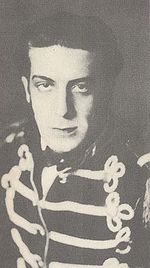
Pedro Sienna
Encyclopedia

Chile
Chile ,officially the Republic of Chile , is a country in South America occupying a long, narrow coastal strip between the Andes mountains to the east and the Pacific Ocean to the west. It borders Peru to the north, Bolivia to the northeast, Argentina to the east, and the Drake Passage in the far...
an playwright, poet, journalist, art critic and theatre and movie actor who is also remembered as one of his country's pioneering directors in the early years of silent film
Silent film
A silent film is a film with no synchronized recorded sound, especially with no spoken dialogue. In silent films for entertainment the dialogue is transmitted through muted gestures, pantomime and title cards...
.
He was married to Julia Benavides Hübler. They had three children, two of them were twins and died while been toddlers and Carmen Julia.
Career
A native of San FernandoSan Fernando, Chile
San Fernando is the capital of the province of Colchagua, in central Chile, and the second most populated urban center of the O'Higgins Region. Located close to the Tinguiririca River in a fertile valley, San Fernando sits 1,112 feet above sea level...
, Pedro Pérez Cordero used the professional nom de plume Pedro Sienna. He began his association with film by directing and starring in El Hombre de acero (1917) and Los Payasos se van (1921).
In 1925, he wrote, directed and starred in the film considered a classic of Chilean silent cinema, El Húsar de la muerte (The Death Hussar).
As a highly-respected author, he wrote Huecas en la Sombra, La Caverna de los Murciélagos, Recuerdos del Soldado Desconocido, Memorias de la Vida del Teatro and the biographical La vida pintoresca de Arturo Bührle.
On 27 December 1966, at the age of 73, Pedro Sienna was awarded the country's national art prize, Premio Nacional de Arte de Chile. He died in Santiago eight weeks short of his 79th birthday.
as director and actor
- 1917: El Hombre de acero
- 1921: Los Payasos se van
- 1922: El Empuje de una raza
- 1924: Un Grito en el mar
- 1926: La Última trasnochada
as actor
- 1918: Todo por la patria or El giron de la bandera (directed by Arturo Mario)
- 1920: Manuel Rodríguez (directed by Arturo Mario)

